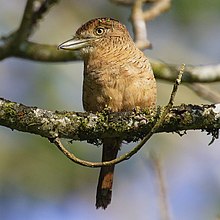Galbuli
| Galbuli | |
|---|---|

| |
| Barred puffbird, (Nystalus radiatus) | |
| Scientific classification | |
| Domain: | Eukaryota |
| Kingdom: | Animalia |
| Phylum: | Chordata |
| Class: | Aves |
| Order: | Piciformes |
| Suborder: | Galbuli Vigors, 1825 |
| Families | |
| Synonyms | |
|
Galbuliformes Fürbringer, 1888 Galbulae Vigors, 1825 | |
Galbuli is one of the two suborders of the order Piciformes and includes two families Bucconidae (puffbirds) and Galbulidae (jacamars). The other suborder Pici is a global group of piciforms, puffbirds and jacamars are only found in the Neotropics.
Systematics
It was thought the jacamars and puffbirds were not closely related to toucans and woodpeckers, but instead related to the order Coraciiformes.[1][2] However, analysis of nuclear DNA in a 2003 study placed them as sister group to Pici, also showing that the groups had developed zygodactyl feet (two toes facing forward and two aft) before separating.[3] Per Ericson and colleagues, in analysing genomic DNA, confirmed that puffbirds and jacamars were sister groups and their place in Piciformes.[4] The lineage is sometimes elevated to order level as Galbuliformes,[5] first proposed by Sibley and Ahlquist in 1990.[2]
Taxonomy
The following arrangement of taxa is based on Witt (2004).[6]
- Suborder Galbuli
- Family Bucconidae
- Genus Nonnula
- Rusty-breasted nunlet, Nonnula rubecula
- Rufous-capped nunlet, Nonnula ruficapilla
- Chestnut-headed nunlet, Nonnula amaurocephala
- Grey-cheeked nunlet, Nonnula frontalis
- Fulvous-chinned nunlet, Nonnula sclateri
- Brown nunlet, Nonnula brunnea
- Genus Malacoptila
- White-chested puffbird, Malacoptila fusca
- Semicollared puffbird, Malacoptila semicincta
- Crescent-chested puffbird, Malacoptila striata
- Black-streaked puffbird, Malacoptila fulvogularis
- Rufous-necked puffbird, Malacoptila rufa
- White-whiskered puffbird, Malacoptila panamensis
- Moustached puffbird, Malacoptila mystacalis
- Genus Bucco
- Collared puffbird, Bucco capensis
- Genus Nystalus
- Spot-backed puffbird, Nystalus maculatus
- Barred puffbird, Nystalus radiatus
- Striolated puffbird, Nystalus striolatus
- White-eared puffbird, Nystalus chacuru
- Genus Chelidoptera
- Swallow-winged puffbird, Chelidoptera tenebrosa
- Genus Monasa
- White-fronted nunbird, Monasa morphoeus
- Yellow-billed nunbird, Monasa flavirostris
- Black-fronted nunbird, Monasa nigrifrons
- Black nunbird, Monasa atra
- Genus Hapaloptila
- White-faced nunbird, Hapaloptila castanea
- Genus Micromonacha
- Lanceolated monklet, Micromonacha lanceolata
- Genus Cyphos
- Chestnut-capped puffbird, Cyphos macrodactylus
- Genus Hypnelus
- Russet-throated puffbird, Hypnelus ruficollis
- Genus Nystactes
- Spotted puffbird, Nystactes tamatia
- Sooty-capped puffbird, Nystactes noanamae
- Genus Notharchus
- Brown-banded puffbird, Notharchus ordii
- Pied puffbird, Notharchus tectus
- Black-breasted puffbird, Notharchus pectoralis
- White-necked puffbird, Notharchus hyperrynchus
- Guianan puffbird, Notharchus macrorhynchos
- Buff-bellied puffbird, Notharchus swainsoni
- Genus Nonnula
- Family Galbulidae
- Genus: Jacamaralcyon
- Three-toed jacamar, Jacamaralcyon tridactyla
- Genus Brachygalba
- Dusky-backed jacamar, Brachygalba salmoni
- Pale-headed jacamar, Brachygalba goeringi
- Brown jacamar, Brachygalba lugubris
- White-throated jacamar, Brachygalba albogularis
- Genus Jacamerops
- Great jacamar, Jacamerops aureus
- Genus Galbalcyrhynchus
- White-eared jacamar, Galbalcyrhynchus leucotis
- Purus jacamar, Galbalcyrhynchus purusianus
- Genus Galbula
- Yellow-billed jacamar, Galbula albirostris
- Blue-necked jacamar, Galbula cyanicollis
- Rufous-tailed jacamar, Galbula ruficauda
- Coppery-chested jacamar, Galbula pastazae
- Green-tailed jacamar, Galbula galbula
- White-chinned jacamar, Galbula tombacea
- Bluish-fronted jacamar, Galbula cyanescens
- Purplish jacamar, Galbula chalcothorax
- Bronzy jacamar, Galbula leucogastra
- Paradise jacamar, Galbula dea
- Genus: Jacamaralcyon
- Family Bucconidae
References
- ^ Sibley, Charles Gald & Ahlquist, Jon Edward (1990): Phylogeny and classification of birds. Yale University Press, New Haven, Conn.
- ^ a b Feduccia, Alan (1999). The Origin and Evolution of Birds. Yale University Press. p. 341. ISBN 9780300078619.
- ^ Johansson, Ulf S.; Ericson, Per G.P. (2003). "Molecular support for a sister group relationship between Pici and Galbulae (Piciformes sensu Wetmore 1960" (PDF). Journal of Avian Biology. 34 (2): 185. doi:10.1034/j.1600-048X.2003.03103.x.
- ^ Ericson, P. G. P.; Anderson, C. L.; Britton, T.; Elzanowski, A.; Johansson, U. S.; Källersjö, M.; Ohlson, J. I.; Parsons, T. J.; Zuccon, D.; Mayr, G. (2006). "Diversification of Neoaves: integration of molecular sequence data and fossils". Biology Letters. 2 (4): 543–547. doi:10.1098/rsbl.2006.0523. PMC 1834003. PMID 17148284.
- ^ Hans Winkler; David A. Christie; David Nurney (2010). Woodpeckers: An Identification Guide to the Woodpeckers of the World. A&C Black. ISBN 9781408135044.
- ^ Witt, C.C. (2004), Rates of Molecular Evolution and their Application to Neotropical Avian Biogeography, Ph.D. dissertation, Louisiana State University
